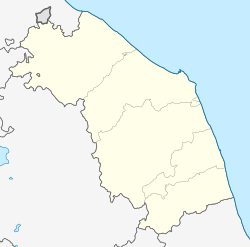This article needs additional citations for verification. (March 2024) |
Fossombrone is a town and comune in the province of Pesaro and Urbino, in the Marche region of central Italy.[3]
Fossombrone | |
|---|---|
| Comune di Fossombrone | |
 | |
| Coordinates: 43°42′N 12°49′E / 43.700°N 12.817°E | |
| Country | Italy |
| Region | Marche |
| Province | Pesaro and Urbino (PU) |
| Frazioni | Belvedere, Calmazzo, Ghilardino, Isola di Fano, Mont'Alto, San Lazzaro, Torricella, Bellaguardia, San Gervasio, San Martino dei muri, Santa Maria della valle |
| Government | |
| • Mayor | Massimo Berloni |
| Area | |
| • Total | 106 km2 (41 sq mi) |
| Elevation | 118 m (387 ft) |
| Population (31 December 2017)[2] | |
| • Total | 9,454 |
| • Density | 89/km2 (230/sq mi) |
| Demonym | Fossombronesi or Forsempronesi |
| Time zone | UTC+1 (CET) |
| • Summer (DST) | UTC+2 (CEST) |
| Postal code | 61034 |
| Dialing code | 0721 |
| Patron saint | Saint Aldebrandus of Fossombrone |
| Saint day | 1 May |
| Website | Official website |
History edit
The ancient Roman colony of Forum Sempronii took its name from Gaius Sempronius Gracchus.
Near the Furlo Pass, during the Gothic War, was fought in 552 the Battle of Taginae, in which Totila was overcome by the Byzantine general, Narses.
Fossombrone was included in the Donation of Pepin, but remained subject to the Duchy of Spoleto until 1198, when it passed under Papal rule. The Malatesta sold it to the famous Federico III da Montefeltro, under whom the city flourished. Also positive for the city was the reign of the della Rovere dukes, who enlarged it (in particular, Francesco Maria II expanded the settlement in the lower area up to the Metauro river). In 1631 it returned to the Papal States, and was annexed to Italy in 1860.
Main sights edit
The city and its environs abound in antiquities, especially inscriptions. Noteworthy remains are the statue of the god Vertumnus; the Furlo Pass, constructed by the Emperor Vespasian to shorten the passage of that mountain; the bridge of Trajan (115) near Calmazzo, and the bridge now called Ponte della Concordia, originally built in 292 by Diocletian, both over the Metaurus.
Religious buildings edit
- Fossombrone Cathedral: built in neoclassical style in 1772–1784.[4]
- Sant'Agostino: (14th century, enlarged in the 18th century). The façade with the coat of arms of the House of Malatesta. The interior houses a canvas by Federico Zuccari.
- San Filippo: deconsecrated church with frescoes and paintings, now used for cultural events.
- San Francesco: located in piazza Dante built in the 18th century at the site of a church of Santa Francesca Romana. The façade has an incomplete sandstone relief by Domenico Rosselli, depicting the Madonna and child with Sts Francis and Bernardino. It was damaged in World War II. The interior is Neoclassical and houses a main altarpiece by Guerrieri depicting a Crucifixion with Saints Francis and Jerome, and a 17th-century crucifix.*Ducal Palace, attributed to Francesco di Giorgio Martini and Girolamo Genga, and built for Cardinal Giuliano della Rovere, brother of the Duke Guidobaldo II. Notable are the Renaissance court and the Cardinal's chapel.
- Santi Giovanni Battista e Floriano
Secular buildings edit
- Corte Bassa, a 16th-century residence of the Dukes of Urbino.
- Corte Alta is instead from the 13th century,[clarification needed] and was later renewed under Federico da Montefeltro with a notable Renaissance façade and pavement. The duke Guidobaldo I stayed here frequently, and also died here.
- Palazzo Comunale (Town Hall, 16th century).
- Palazzo Vescovile ("Bishop's Palace", built from 1479). It has a Renaissance façade with a portico and a fresco of the Crucifixion attributed to Bartolomeo di Gentile (1493).
- Rocca Malatestiana (13th to 15th century) now in ruin.
- Quadreria Cesarini - a house museum: the collection features mainly 20th century local artists
Sports edit
- FC Fossombrone, a football club whose strip is produced by Dirk Bikkembergs, a Belgian fashion designer.
Twin towns edit
- Entraigues-sur-la-Sorgue, France
See also edit
References edit
- ^ "Superficie di Comuni Province e Regioni italiane al 9 ottobre 2011". Italian National Institute of Statistics. Retrieved 16 March 2019.
- ^ "Popolazione Residente al 1° Gennaio 2018". Italian National Institute of Statistics. Retrieved 16 March 2019.
- ^ "Da Fossombrone la volata internazionale di Pesaro2024: le telecamere Rai del Giro d'Italia immortalano lo striscione di 364mq dedicato alla Capitale" [The international sprint of Pesaro2024 from Fossombrone: the Rai cameras of the Giro d'Italia immortalize the 364m2 banner dedicated to the Capital]. Comune di Pesaro (in Italian). 13 May 2023. Retrieved 1 March 2024.
- ^ Gori, Giancarlo; Savelli, Renzo (4 August 2010). "Fossombrone: Cattedrale". La Valle del Metauro. Retrieved 1 March 2024.
External links edit
- Chisholm, Hugh, ed. (1911). . Encyclopædia Britannica. Vol. 10 (11th ed.). Cambridge University Press. pp. 731–732.
- This article incorporates text from a publication now in the public domain: Herbermann, Charles, ed. (1913). "Fossombrone (Forum Sempronii)". Catholic Encyclopedia. New York: Robert Appleton Company.



